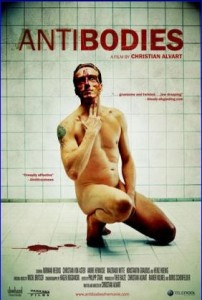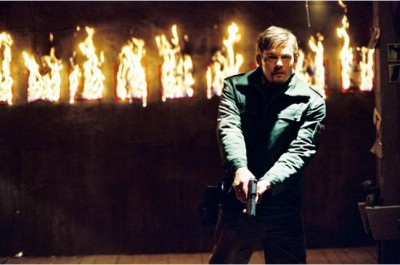By: debbie lynn elias
 There are times when nothing is more enjoyable than a gripping, creepy, psychological thriller. You know the kind. The ones that have you afraid to sit in the dark – alone (or in my case, alone is preferable to the ex-boyfriend). The ones with a visceral and vicious edge to them. The ones that have you expecting Anthony Hopkins in his most Hannibal Lecterish voice, intoning “quid pro quo, quid pro quo.” Your skin crawls and yet, despite the blood and horror, you are spellbound and mesmerized by the visuals and the story that is settling deep into your own thoughts. Such is director Christian Alvart’s latest work – ANTIBODIES.
There are times when nothing is more enjoyable than a gripping, creepy, psychological thriller. You know the kind. The ones that have you afraid to sit in the dark – alone (or in my case, alone is preferable to the ex-boyfriend). The ones with a visceral and vicious edge to them. The ones that have you expecting Anthony Hopkins in his most Hannibal Lecterish voice, intoning “quid pro quo, quid pro quo.” Your skin crawls and yet, despite the blood and horror, you are spellbound and mesmerized by the visuals and the story that is settling deep into your own thoughts. Such is director Christian Alvart’s latest work – ANTIBODIES.
Michael Martens is a German farmer in the little town of Herzbach. A deeply religious man, he is humble, honest and hardworking. A man of the earth with convictions of right and wrong that would rival that of a man of the cloth. Doing double duty as the town’s constable, his greatest self-perceived failure has been his inability to solve the murder of a local girl, Lucia Flieder, a friend of his son. Haunted by his failure, his obsession with the murder drives a wedge not only between himself and the local townspeople but his wife and his troublemaking son, as well. But miraculously, it appears that Martens torment may come to a close as he ultimately finds joy when one Gabriel Engel is suddenly arrested in Berlin, accused of committing countless sexual offenses and serial murders of innocent children over a six year time span with an MO that includes painting religious pictures on the victim’s bodies with their blood. Believing Engel to be somehow linked to Flieder’s unsolved murder, Martens travels to Berlin to question the suspect.

Initially, Engel is singing like a bird, bragging of his accomplished and skilled killings. But as soon as the cuffs are on and the jailhouse door clicks shut, so does Engel. That is until Martens arrives. With the consent of city investigator Seiler, Martens undertakes a grueling interrogation of Engels. Although the cat and mouse game proves helpful to Seiler, it is more than disheartening to Martens as although Engel brags about the beauty and perfection of his handiwork in various murders, he denies committing that investigated by Martens. Engel’s egomaniacal belief of self-superiority over the dominion of the earth, the sky, and life itself (including law enforcement) is staggeringly, disturbingly and sickenly bold – particularly when providing little tidbits of information on Martens’ investigation, such as an admission to witnessing the murder and full knowledge of the killer.
Dragging Martens kicking and screaming into his psychotic horror, Engel propels Martens deep into his own psyche. Like a new plant bursting through the ground craving sunlight and nourishment, so goes Martens with Engel planting seeds of doubt and evil at every turn, forcing Martens to question himself, his beliefs, his abilities and exactly who took the life of Lucia Flieder.
Wotan Wilke Mohring is commanding as Michael Martens. This is his movie. Admittedly stepping out of his own comfort zone, Mohring’s professionalism and meticulous attention to detail found him learning religious basics such as “how to fold your hands in prayer” and learning the “patterns and standards [that someone], who is the ideal Catholic in a small village lives by. Jumping from the piety of the character into the mental monstrosity of his character’s foil, Engel, one can see the wheels turning in Mohring’s head as his interpretation of Martens transforms and transcends into something inexplicably impressive and responsive to the mental hijinx of Andre Hennicke’s Engel. Mohring gives Martens a depth of soul and character. And what of Andre Hennicke? Harkening to obvious comparisons with Anthony Hopkins’ most infamous character of Hannibal Lecter, Hennicke’s Gabriel Engel is simply masterful. Capitalizing on the character’s sense of self-importance and superior intellect, Hennicke is cold, distant, insatiably self-absorbed and manipulative, taking the audience on a roller coaster ride of deftly nuanced psychological horror.
Written and directed by Christian Alvart, the script is tightly woven with suspenseful tension that doesn’t pander to cheap cliches or parlay true psychological terror to the obvious, cheap or tawdry. He makes you think. He makes you wonder. He pushes the envelope of paranoia and fear set against a counterplay of biblical allegory and the philosophical struggle between good and evil. By the very creation of Martens and Engel, we see the Devil tempting Adam in the Garden of Eden, immediately posing questions of what makes the man, what separates good from evil, what drives one to self-satisfaction and self-gratification at the expense of others be it in the name of good or evil. The symbolic structure is in and of itself fascinating. Compounding on the basic intrigue of the story, Alvart adds several plot twists that even the most savvy film lover will not expect.
Technically the film is also impressive. From the opening scene which vividly details Engel’s capture after a heated chase complete with gunfire, dead bodies, and even a naked body flying through a shattered plate glass window, the film moves methodically but well paced, never letting the tension lapse and daring the audience to even breathe. Of particular note is the cinematography of Hagen Bogdanski that provides a vivid (and visceral) silken slickness to the film as a whole that I find absolutely mesmerizing.
In German with English sub-titles, the performances of Mohring and Hennicke together with the visuals are strong enough that even were there not subtitles, one would know exactly what terror had taken hold.
Michael Martens: Wotan Wilke Mohring
Gabriel Engel: Andrew Hennicke
Detective Seiler: Heinz Hoenig
Written and directed by Christian Alvart. (127 min. )












